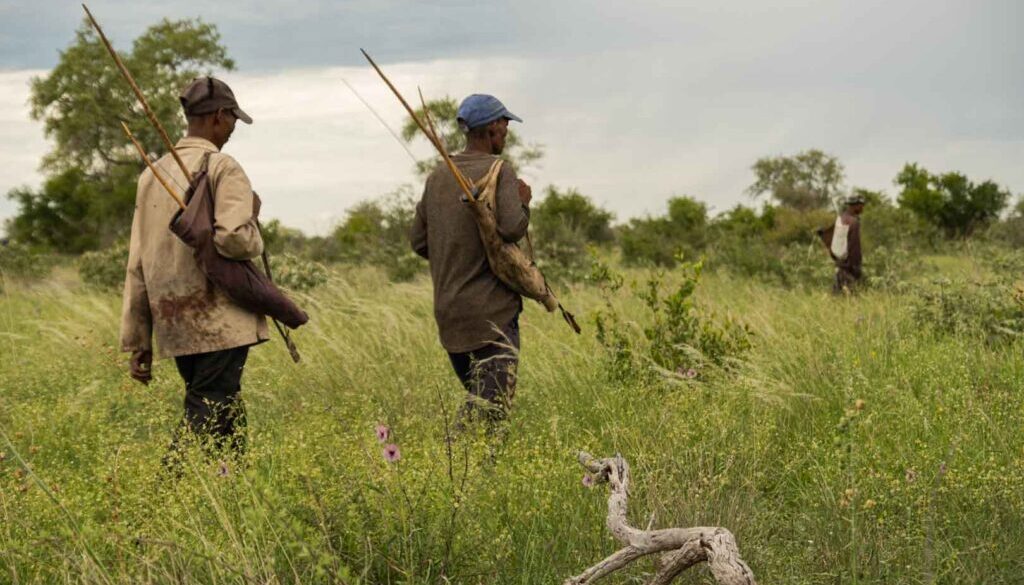Going Far With Others: Co-Existence in the Kalahari
“Our old people long ago had a government, and it was an ember from the fire where we last lived, which we used to light the fire at the new place we were going”.
Di//xao, Ju/’hoansi elder.
Nyae Nyae, Namibia
January 2020
This is where it all supposedly began. Our latest understanding is that everyone alive today can trace their genetic code back to a so-called ‘mitochondrial Eve’, a maternal starting point in northern Botswana, just a few hundred kilometres from here. As some of the last remaining hunter gatherers in the world, few other cultures offer such a window into the evolution of our earliest social bonds than the San people of the Kalahari. It’s a classic trope of anthropology to see certain peoples as essentialised fossils of our past, but no cultures remain static. The San are no exception, many have abandoned the older ways of life, either by choice or by force. But in the village of Den/ui, deep in the bush and far from the nearest road, one community is choosing to sustain their culture of communal living in their own way.
Perhaps democracy isn’t the first word that springs to mind when we think of hunter gatherer societies. But in the unforgiving climate of the Kalahari Basin, collective decision-making isn’t just about romantic ideas of all ‘getting along’ – it’s about survival. A lone individual in the bush doesn’t last long – food gathering out here is a collaborative activity by its nature. /Ui (pronounced tsui), is one of southern Africa’s most revered trackers but he is also a respected elder here. He knows that it takes more than just physical endurance and hunting prowess to survive in this environment. After he lost his wife to tuberculosis, it was the tight community bonds and shared parenting in the village – born out of mutual trust and flat hierarchies – that ensured his children were fed and cared for.
In /Ui’s neighbouring village, trouble is brewing. /Kunta and his wife //Eng have relationship issues. /Kunta has been drinking a lot of late, and //Eng suspects that he’s been seeing another woman. Some problems are the same the world over it seems. She wants to leave him following repeatedly heated arguments, but neither /Kunta nor the village want her to go. When an issue like this arises among communities, the tension is tackled head on and the whole village turns out to ‘sit under the big tree’ to find a resolution. The message is clear – what affects the individual affects the whole, and harmonious coexistence of the group prevails over any individual spat. Elders may guide the flow of deliberation, but the decision lies with the group. The term ‘primitive communism’ has been used in the past to describe hunter-gatherer societies. But there’s nothing primitive about the San. Their way of life is highly tuned to their environment, far more so than our unwieldy and unpredictable markets.

The San remind us that systems that do not encourage harmony and consensus, not only between its constituent parts, but equally with its environment, are inherently unstable. Democracy, it seems, has been our evolutionary partner since the beginning. It’s something that the technological advancements of modernity, having freed us from dependence (superficially at least) on our natural environment have allowed us to forget. But as we arrive at the limits of exploitation of our ecological niche as a species, we’re arguably coming back around to something akin to the environmental constraints faced by the San. It’s just that now we have to work out ways to cooperate at the level of eight billion individuals. Well, it’s not that we have to. Survival is not mandatory after all. It’s just that it might be nice.

There are undoubtedly valuable lessons for us here, many of which have been lost somewhere along the way in the trajectory of modern civilisation. Yet while it may be comparatively straightforward for a single village to discuss affairs under a tree in the Kalahari, the exercise becomes far more problematic in nation states of millions. Whether or not you’re of the opinion that we should all just return to living in small groups in harmony with nature and each other is beside the point. It’s 2020, we are where we are, and for most of us we can’t go back to a life of foraging in the bush with our extended family, romantic as it might sound to some. Nor can we stay stuck here lest we wish to invite civilisational and ecological collapse. Can we find a synthesis of the forgotten elements of the San way of life with the more desirable elements of modernity?
The only way is forward, and the only question is how. And on this, we have to admit to feeling a bit at a loss. Tracing democracy back through our social evolution and stripping it down to its essence has revealed a great deal, but when it comes to how to move forward from here, the compass is spinning. So far we’ve been looking to humanity for inspiration to the problems of our age, foremost among which is the ecological crisis. Perhaps it’s time we gave mother nature herself a say in the debate.
CLICK HERE TO VIEW THE PHOTOGRAPHY
